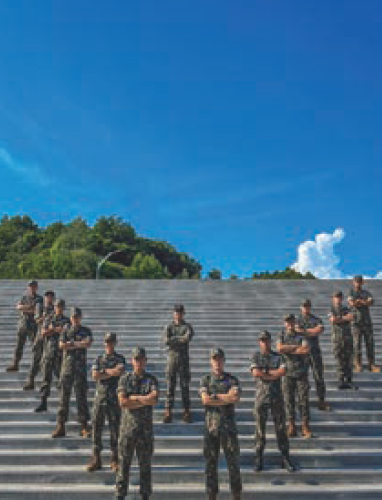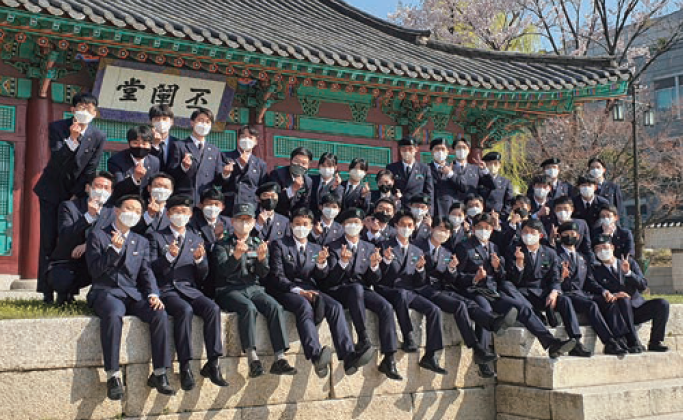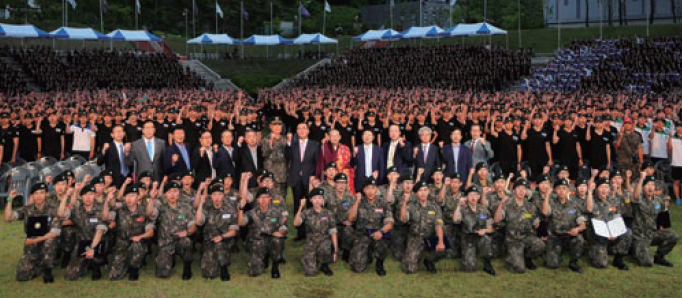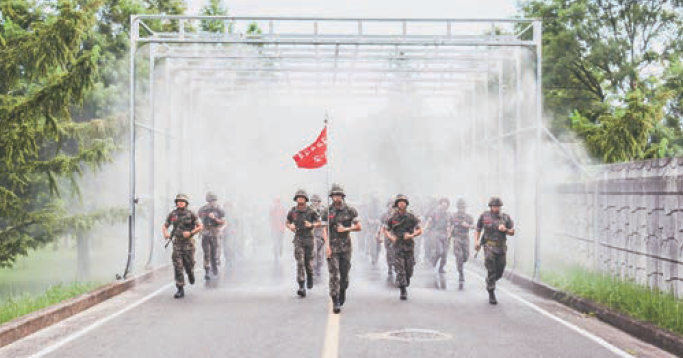While wandering around campus, we might run into Kingos wearing a full-dress uniform. They are soon-to-be officers of the Korean Armed Forces belonging to the Reserve Officers' Training Corps (ROTC) who will be commissioned after college. However, most people do not exactly know what the ROTC is. Thus, the Sungkyun Times (SKT) will introduce the definition, shortcomings and solutions, and benefits of the ROTC.
Curious about the ROTC?
The SKT Presents to You, the ROTC
The ROTC program aims to train and prepare university students for junior military officers. The ROTC program, run by the Korean Armed Forces, was established in 1961 and was modeled after a program in the United States (U.S.) of the same name. The Korean ROTC has produced over 230,000 junior officers, commissioning 3,561 new officers in 2022. Currently, the Korean Armed Forces’ ROTC program is run in 110 different universities and directs not only Army officers but also Navy, Air Force and Marine Corps officers. Cadets in the ROTC receive training during their junior and senior years and go through three separate intensive training periods during the summer and winter breaks. One key difference between the Korean ROTC program and the U.S. lies in the program’s objective. While the U.S. ROTC seeks to produce reserve officers who can be commissioned at times of war, the Korean Armed Forces operates its ROTC program to produce and commission junior officers as soon as they graduate. For example, while 95% of all U.S. ROTC graduates are assigned to the reserve forces, all Korean Armed Forces’ ROTC graduates are assigned junior commanding posts as second lieutenants in the Korean Armed Forces.
The ROTC at SKKU
Like many universities in Korea, Sungkyunkwan University (SKKU) also has its own ROTC: the 103rd corps at the Humanities and Social Sciences Campus (HSSC) and the 1031st corps at the Natural Sciences Campus (NSC). The ROTC at SKKU was first introduced in 1961, when the Korean ROTC was first founded. The head of the 103rd ROTC corps, Lieutenant Colonel Lee Myung-hee, said, “The SKKU ROTC aims to produce junior officers with a deep understanding of the Sunkyunkwan teachings of self-cultivation, as well as the ROTC’s motto of wisdom, trust, and courage.” As of 2022, the SKKU ROTC has produced a total of 5,426 junior officers for the Korean Armed Forces. There are currently 93 cadets in the 103rd and 1031st ROTCs corps. Cho Eun-bi (Junior, School of Sport Sciences, ROTC 62nd) said, “Overcoming hardships with my fellow ROTC peers has transformed us into a ‘family’; thus, I feel very proud of my peers.” Interested Kingos can learn more by contacting the 103rd corps at 02-760-1308, the 1031st corps at 031-290-5301, or by direct messaging official Instagram accounts of each corps.

The Falling Status of ROTC, and How to Save It
The Decline of the ROTC
A problem concerning the ROTC is that the students’ preference for ROTC has been in a consistent decline. This has led to a fall in the quality and quantity of applicants. The competition has fallen from 4.5:1 to 2.4:1 in the last five years. One of the reasons for this is that officers' treatment has not improved compared to that of general enlistees. First of all, unlike enlisted soldiers, whose mandatory service period has been consistently reduced, officers’ service period has remained the same for the last 60 years. Shim Hyo-jae (Senior, Economics, ROTC 61st) stated, “Preference for the ROTC was higher in the past due to the relatively short service period. However, nowadays, students are feeling more reluctant to apply due to an overturn in this trend.” Furthermore, wages have also been a significant problem; a second lieutenant’s salary is forecasted to be overtaken by enlisted sergeants by 2025. Finally, employment after discharge has been criticized for being unclear. As graduates of the ROTC must complete a mandatory military service of 28 months, they have fewer opportunities to build up their resumes, making it difficult to find a job. This problem becomes even more serious as the ROTC cadets must participate in military training during summer and winter vacations; therefore, they have less time to experience other college activities, such as internships and student associations.

The Solution: Treat Our Officers Better!
Support on the national level is crucial to overcome the shortcomings, increase applications, and prevent a hole in the Korean Armed Force’s command. One solution to this includes improving the economic compensation of the ROTC officers. An increase in the salary of second lieutenants might mean a complete reform of the military’s compensation system, but this will undoubtedly lead to an increase in applicants. Recently, President Yoon Suk-yeol has pledged to support discharged officers by providing them extra credit when applying for public housing. This policy will be a good measure to solute officers' monetary problem. On the other hand, companies should give preferential treatment to discharged ROTC officers when recruiting new employees. You Na-eun (Junior, Confucianism and Oriental Studies, ROTC 62nd) said, “This will greatly reduce the pressure on officers concerning employment, as many do not have enough time to build up their resume. I hope to see this trend expand.” The Korean Armed Forces have implemented a policy of supporting officers’ job hunting to relieve the burden regarding employment; they run a Military Personnel Job Fair to support both those commissioned and discharged. The Federation of Korean ROTC also provides employment information to officers, which may lessen their difficulties. Treating our officers better and improving their general benefits and compensation will help prevent a breakdown of the Korean Armed Force’s command backbone.

For Kingos Contemplating…
Social Advantages of the ROTC
Completing mandatory military service with the ROTC will grant an individual higher respect and better treatment. Officers, even junior officers, have much more freedom when taking personal time off. They also receive housing support and additional compensation for their families. Becoming an officer through the ROTC offers applicants much more space in training and service compared to a military academy or Officer Candidate School (OCS); as ROTC cadets are university students, they have more liberties. For the military academy, one must spend the entire four years of courses on campus, and for OCS, one must spend the whole four-month training period on a military base. However, the mandatory service period of the ROTC is 28 months, which is considerably shorter than the five years of the military academy and the 40 months of the OCS. This means that ROTC cadets who do not plan to have a military career can return to civilian life much quickly. Moreover, the ROTC, which makes up about 70% of all military officers in Korea, has a strong network among graduates. For example, the Federation of Korean ROTC acts as a communal hub for ROTC graduates, where business information is exchanged and scholarships are given to outstanding ROTC cadets. Heo Sung-ho, (Senior, School of Sport Sciences, ROTC 61st) said, “The ROTC community spans beyond schools, and graduates can utilize this network to their advantage.”

ROTC, a Financial Booster
The Korean Armed Forces provide ROTC cadets and officers with many economic opportunities, which can improve the financial situation of the ROTC officer significantly beyond that of their age group. ROTC cadets can receive different types of compensation while attending college; for instance, they receive ₩70,000 every month. Moreover, they are provided with around ₩600,000 each time they participate in training programs during summer or winter vacations, and can even receive scholarships based on merit. Jeon Jae-hui (Junior, Korean Literature in Classical Chinese, ROTC 62nd) explained, “The fact that ROTC cadets can use military facilities all around Korea, as well as several discount offers provided to only the cadets, is a big morale booster.” Meanwhile, the Korean Armed Forces operate a program where financially limited cadets can receive a full tuition waiver in exchange for extended mandatory service. This program helps reduce the pressure on the graduated officer to repay student loans. Furthermore, junior officers are guaranteed a monthly salary of ₩1,750,000, which increases with a rise in rank; thus, the ROTC program emphasizes that an officer will be able to save up to ₩30 million during their 28-month mandatory service. Additionally, ROTC graduates receive a short-term service bonus of ₩6 million, which puts them in a favorable financial position.
While the Korean Armed Forces supports the ROTC program in many aspects, its shortcomings have resulted in a decline in the ROTC application rate. However, some Kingos have chosen this hard road of the ROTC with a dream of becoming junior officers of the Korean Armed Forces. The next time you see an ROTC cadet wearing a full-dress uniform, why not approach them with a little less distance and a little more friendliness?
